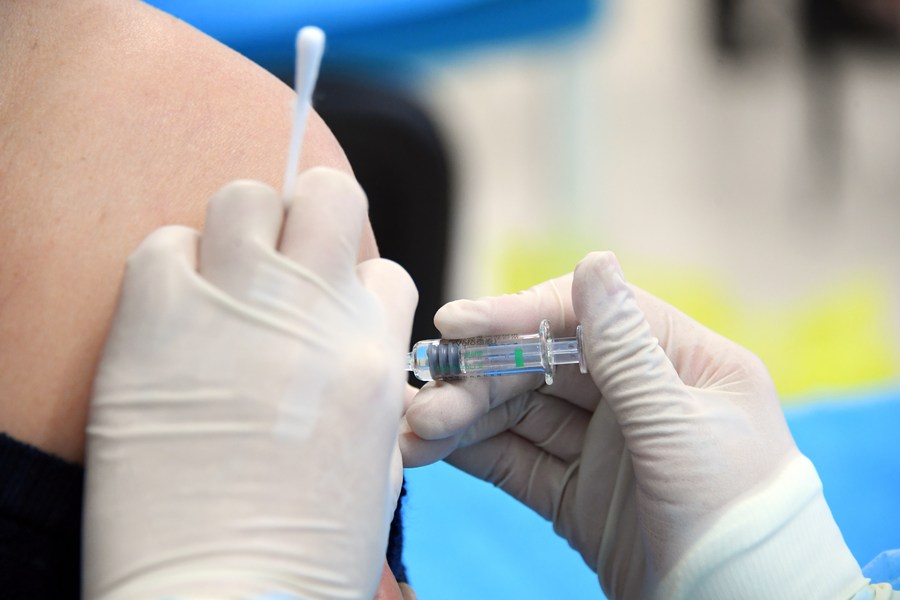

A medical worker inoculates a recipient with a COVID-19 vaccine at a temporary inoculation site in Haidian District
in Beijing, capital of China, Jan. 11, 2021. [Photo/Xinhua]
While the end of the COVID-19 pandemic is seen as being not far off, experts and officials said over the weekend that developing novel and multivalent vaccines, monitoring immunity levels across the population and increasing booster-shot coverage among vulnerable groups remain essential tasks.
Citing data from the World Health Organization, Qi Xiaopeng, a researcher at the Chinese Center for Disease Control and Prevention, said that the numbers of new global infections and deaths have dropped to their lowest levels since the virus first emerged in late 2019.
Around 50 countries, mostly in Africa and North America, have reported no new infections in the past 30 days and many other countries have also seen a reduced frequency of case reporting as the epidemic wanes, she told a forum during the 2023 National Vaccines and Health Conference on Saturday.
The event, the fifth of its kind, was held by the Chinese Preventive Medicine Association and the China CDC in Hangzhou, Zhejiang province over the weekend.
China downgraded the management of the virus from Class A to B on Jan 8.Qi said that as of April 11, 192 countries no longer required negative nucleic acid tests for incoming vaccinated passengers from the Chinese mainland.
Li Bin, deputy director of the National Health Commission, said that China's mass vaccination campaign has played a vital role in enabling it to protect susceptible groups, reduce severe cases and deaths and secure a victory against the virus.
China has delivered nearly 3.5 billion doses and fully vaccinated about 1.28 billion people, according to official data.
"At present and for quite some time in the future, it is important to step up research on immunogenicity, the length and strength of long-term immunity of COVID-19 vaccines, as well as closely studying the impact of new variants on existing vaccines, and boosting vaccine development preparedness against key novel strains," he said.
So far, China has 17 COVID-19 vaccine products that have completed or are undergoing third-stage trials.
Dong Xiaoping, chief virologist at the China CDC, said that the mainland now reports around 2,000 COVID-19 cases daily, and that the number of total infections is estimated to multiply several times as many cases will likely go unreported if hospital visits are not needed. "This suggests that COVID-19 will likely morph from a contagious virus capable of triggering acute outbreaks to one appearing in sporadic clusters and become a routine illness, like flu," he said.
Dong added that multiple and varied Omicron strains will likely circulate simultaneously in different parts of the world in the future.
For instance, while BA.5.2.48 and BF.7.14 continued to be the dominant strains in China in late March, XBB strains are claiming increasingly high proportions in North America, Europe and Africa. "As China's interaction with the rest of the world deepens, XBB strains are bound to exert a bigger influence in the future," he said.
Dong said the circulation of different strains will pose challenges to developing and distributing vaccines. "It is possible that we will need to launch seasonal COVID-19 vaccinations in the future, similar to flu jabs," he said.
He said that the most ideal version of a vaccine is a wide-spectrum dose, or a multivalent dose, tailored to tackle specific dominant strains in a specific region.
"It is also important to establish a vaccine-making platform that can quickly design and produce vaccines to fend off the latest dominant strains," he said, adding that it should be easier for drugmakers to streamline market approval procedures.
He added that nasal sprays or inhaled vaccines are also promising approaches and that prioritizing immunization among the elderly and other vulnerable groups, as well as high-risk professionals such as public health workers and doctors, is important.
Zhang Jun, dean of Xiamen University's School of Public Health in Fujian province, said that a global consensus has been reached on strengthening development of broad-spectrum vaccines, and nasal sprays or inhaled vaccines, which are capable of inducing robust immunity at the point through which the virus enters the body.
He added that five nasal or inhaled vaccines have gained market approval worldwide, including two developed by Chinese researchers.
Yin Zundong, head of the China CDC's national immunization program, said that with the highly transmissible Omicron and its subvariants in circulation, heightened efforts will be dedicated to expanding coverage among the elderly and vulnerable groups, such as those with chronic diseases, who are at higher risks of developing a severe case or of dying.
Yin added that medical workers are pushing research into evaluating the real-world efficacy outcomes of domestic COVID-19 vaccines.
